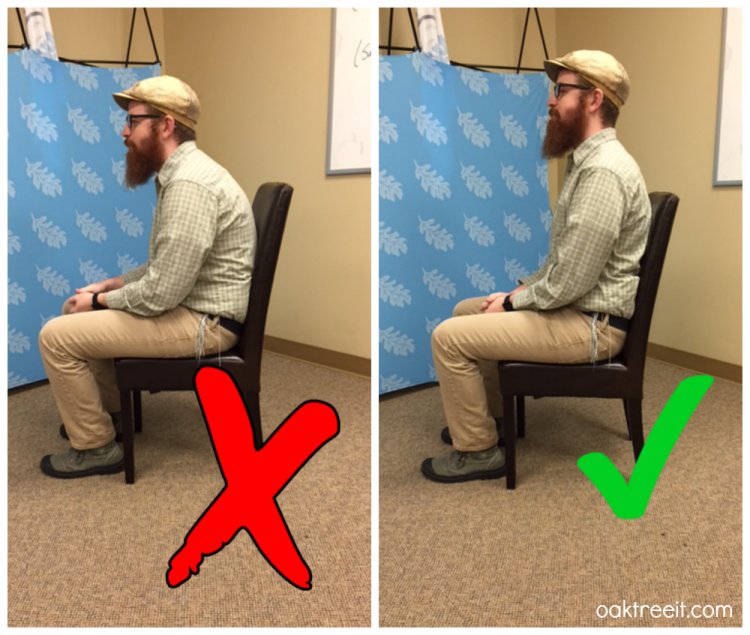How to Sit During a Job Interview &Get Hired
Sitting posture during a job interview can review whether your employer to be will hire you or not. This is because different sitting positions tell more about you.

During a job interview, you are required to sit upright. Sitting straight not only conveys confidence but will also make you feel more like a leader. Lean forward slightly and maintain eye contact. Lean forward slightly to convey that you are listening and engaged in the conversation.

During an interview, you need to show confidence in yourself to show your employer to be that you know what you're saying.
1. Maintain strong body positioning- maintain your sitting position unless otherwise.
2. Smile and try to enjoy the process- try to smile at the interviewer while listening to avoid losing the main aim of the interview.
3. Deliver your answers calmly and slowly- remember never to be harsh even if your interviewee is asking you a similar question a thousand times.
4. Avoid rambling.
5. Practice your tone of voice- Do this to void talking in a too-loud voice or too low a voice.
6. Practice your handshake-know when to shake hands and when not to.
7. Interview the employer- You may do this when he /she poses questions if you have a question with them.
8. Don't come across as desperate- Don't be desperate for the job offer or rather have high expectations.
Below are the latest Job opportunities you can apply for.
-
Jobs at UNICEF
- View Jobs in NGO / Non-Profit Associations / View Jobs at UNICEF
About UNICEF
- Contents
- Open Jobs
Senior Specialist (Immunization Financing)
- Job TypeFull Time
- QualificationMBA/MSc/MA
- Experience10 years
- LocationNairobi
- Job FieldData Science / Research
Advisory services and technical support
- Provide technical support to countries on immunization planning, costing, and budgeting. This includes the estimation of costs for National Immunization Strategies (NIS) using the NIS.COST approach
- Generate evidence and undertake implementation research on costs of vaccine delivery, especially related to interventions for reaching zero-dose children
- Undertake cost-effectiveness analyses, investment cases and costs of inaction studies related to primary health care and immunization
- Contribute to work on tracking global immunization expenditures and financing sources
- Contribute to establishing a database for Government immunization budgets
- Collaborate with UNICEF Social Policy Specialists on Public Expenditure Reviews and efforts for strengthening public financial management systems in the health sector
- Advise governments, NGO partners, and UN system partners on policies, strategies, and best practices for sustainable immunization financing
Advocacy, networking, and partnership building
- Build and strengthen strategic partnerships with donors, NGOs, academia and health sector government counterparts through active networking, advocacy and effective communication of UNICEF’s mission, goals, programmes, and resource mobilizations needs.
- Participate and/or represent UNICEF in inter-agency discussions and planning for immunization financing activities to ensure organizational position, interests and priorities are fully considered and integrated.
Innovation, knowledge management and capacity building
- Promote critical thinking, innovative approaches, and good practices for sustainable financing of primary health care and immunization
- Keep abreast of health economic research and implement the best and cutting-edge practices
- Share best practices and knowledge learned internally and externally
- Lead, plan and implement capacity-building initiatives to UNICEF country offices on health economic approaches and analyses
To qualify as an advocate for every child you will have...
Education:
- An advanced university degree in one of the following fields is required: health economics, economics, public health, business administration, statistics, international health or another relevant technical field.
Experience:
The following is required:
- A minimum of ten years of professional experience in health economics or public financing at the international level
- Strong quantitative skills
- Experience working in a low-income setting
- Experience in Public Financial Management within the health sector
- Experience in cost analysis of health interventions
- Excellent interpersonal skills to develop and maintain good working relationships
- Ability to communicate effectively with a range of audiences
Additional experience considered an asset:
- Experience in undertaking cost-effectiveness analysis of health interventions
- Experience in economic analysis of vaccination services
- Record of research publications in international academic journals Relevant experience in a UN system agency or organization
Gender Officer (Junior Professional Officer)
- Job TypeFull Time
- QualificationBA/BSc/HND
- Experience2 years
- LocationNairobi
- Job FieldNGO/Non-Profit
To qualify for this JPO position and as an advocate for every child you will have...
- A Canadian citizenship
- Max 32 years at the end of application year
- An advanced university degree (Master’s or higher) in one of the following fields is required: International Human Rights. Humanitarian Law, Social Sciences, Development studies, Anthropology, or another relevant technical field.
- A minimum of 2 years of relevant professional experience.
- Experience working in a developing country is considered as a strong asset. Background and/or familiarity with emergency is considered as a strong asset.
- Fluency in English is required. Fluency in English is required. Knowledge of French, Portuguese and/or Swahili is considered as an asset.

























